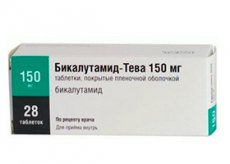Medical expert of the article
New publications
Preparations
Bicalutamide
Last reviewed: 03.07.2025

All iLive content is medically reviewed or fact checked to ensure as much factual accuracy as possible.
We have strict sourcing guidelines and only link to reputable media sites, academic research institutions and, whenever possible, medically peer reviewed studies. Note that the numbers in parentheses ([1], [2], etc.) are clickable links to these studies.
If you feel that any of our content is inaccurate, out-of-date, or otherwise questionable, please select it and press Ctrl + Enter.

Indications Bicalutamide
It is used for monotherapy and in combination treatment for people with prostate carcinoma (combined with radiotherapy procedures or with radical prostatectomy for non-metastatic malignant tumors).
It can also be prescribed to people who are not subject to the above procedures.
Pharmacodynamics
Bicalutamide has antiandrogenic properties and is non-steroidal in nature. The substance has no other endocrine effects.
It is synthesized with androgenic endings and inhibits the stimulating effect exerted by androgens, while activation of gene expression does not occur. Due to these processes, regression of malignant cancerous tumors in the prostate area develops.
Pharmacokinetics
The medicine is absorbed quickly and completely in the gastrointestinal tract. Food does not affect this process in any way.
Protein synthesis is 96%. Metabolic processes are carried out in the liver. The half-life of the metabolic product is approximately 7 days.
Excretion of the drug occurs in the form of metabolic products - with urine and bile.
Dosing and administration
For adults, a single oral administration of 50 mg of the drug per day is prescribed in combination with a surgical castration procedure or with an analogue of the LHRH component.
If there are no metastases of prostate carcinoma, a single dose of 0.15 g of the substance per day is used to treat the malignant tumor without surgical castration and the use of other medications.
The medicine must be taken over a long period of time (at least 2 years).
If the patient has severe liver dysfunction, portion size adjustments are required.
 [ 19 ]
[ 19 ]
Use Bicalutamide during pregnancy
This medication is not prescribed to women.
Contraindications
Main contraindications:
- the presence of intolerance to the medication;
- combined use with cisapride, terfenadine or astemizole;
- hypolactasia or lactase deficiency.
 [ 16 ]
[ 16 ]
Side effects Bicalutamide
Some people develop signs of gynecomastia, as well as pain in the mammary glands. Jaundice, asthenia, hot flashes, itching, diarrhea, vomiting, a feeling of intense drowsiness or insomnia, as well as nausea, dizziness, dyspnea, headaches, heart failure, and pain in the pelvic and sternum areas may also occur.
Interactions with other drugs
Bicalutamide potentiates the effects of indirect anticoagulants.
Not compatible with cisapride, astemizole, and terfenadine.
The drug increases the likelihood of adverse effects when used with cyclosporine and medications that suppress oxidative processes within microsomes (ketoconazole with cimetidine).
Shelf life
Bicalutamide can be used within 36 months from the date of manufacture of the therapeutic drug.
 [ 25 ]
[ 25 ]
Application for children
Bicalutamide should not be prescribed in pediatrics.
 [ 26 ]
[ 26 ]
Analogues
Analogues of the drug are Kalumid, Bikalan, Casodex with Bikulide, as well as Bicalutera and Bilumid.
 [ 27 ], [ 28 ], [ 29 ], [ 30 ], [ 31 ]
[ 27 ], [ 28 ], [ 29 ], [ 30 ], [ 31 ]
Reviews
Bicalutamide receives mostly positive reviews. In many patients, its use leads to the development of stable remission. However, a large number of patients also note the occurrence of jaundice, weakness, abdominal pain, and decreased hemoglobin levels.
Attention!
To simplify the perception of information, this instruction for use of the drug "Bicalutamide" translated and presented in a special form on the basis of the official instructions for medical use of the drug. Before use read the annotation that came directly to medicines.
Description provided for informational purposes and is not a guide to self-healing. The need for this drug, the purpose of the treatment regimen, methods and dose of the drug is determined solely by the attending physician. Self-medication is dangerous for your health.

